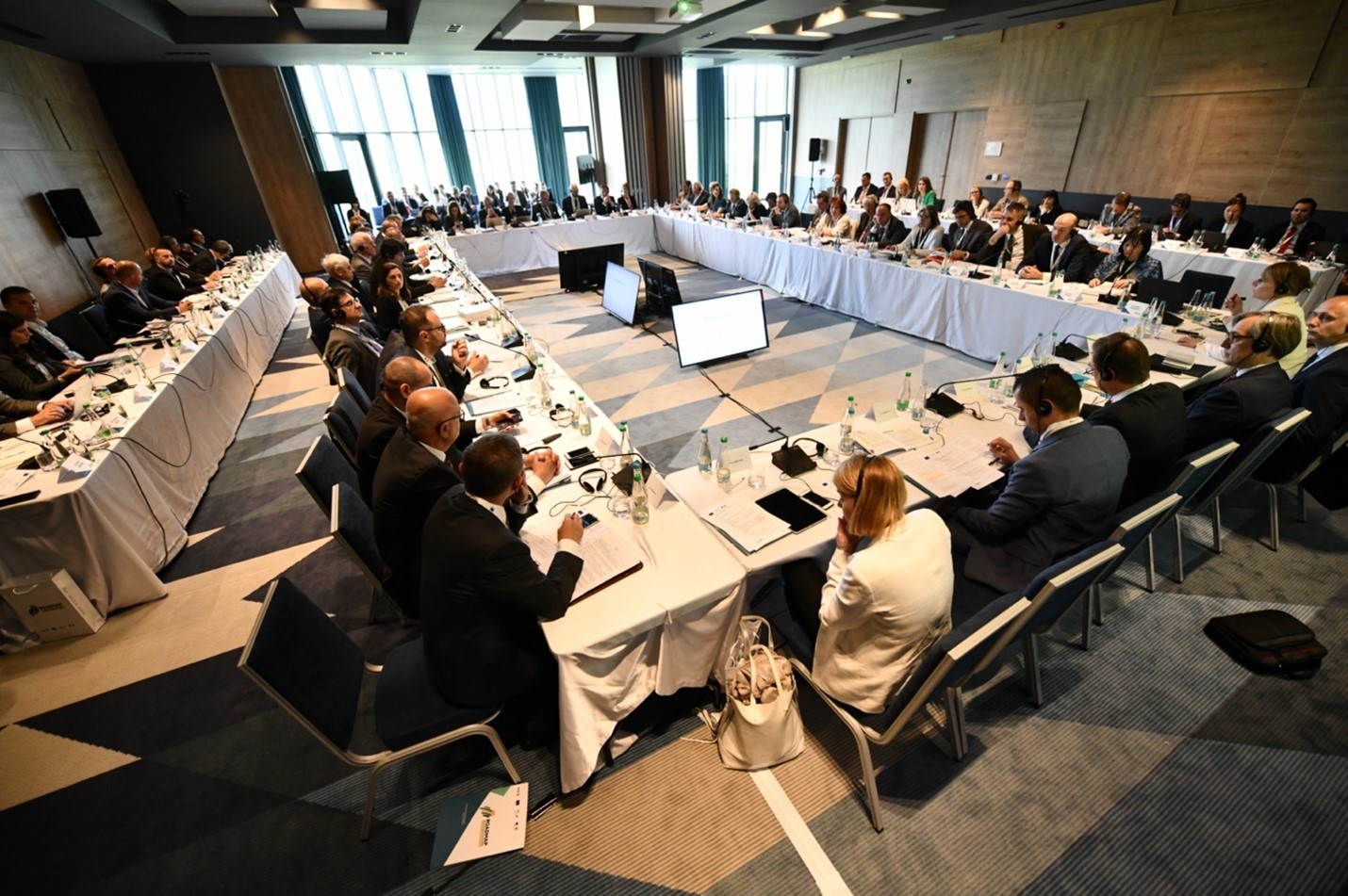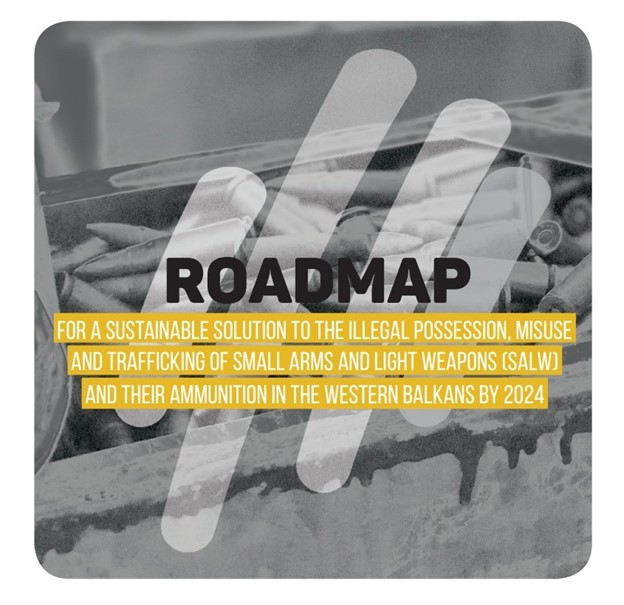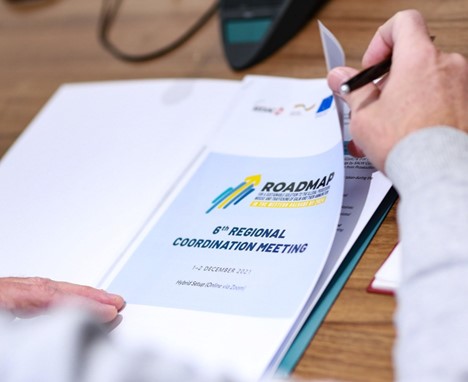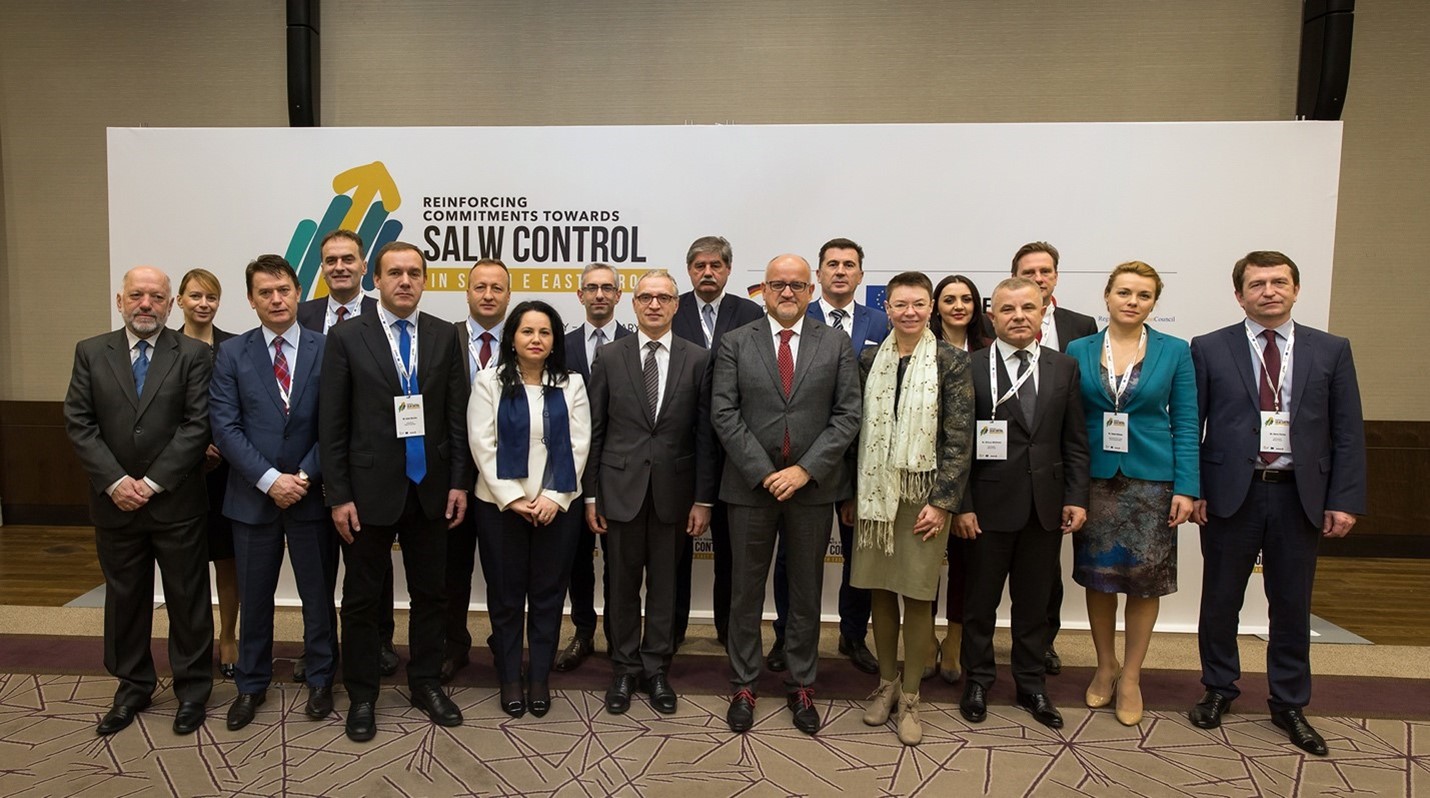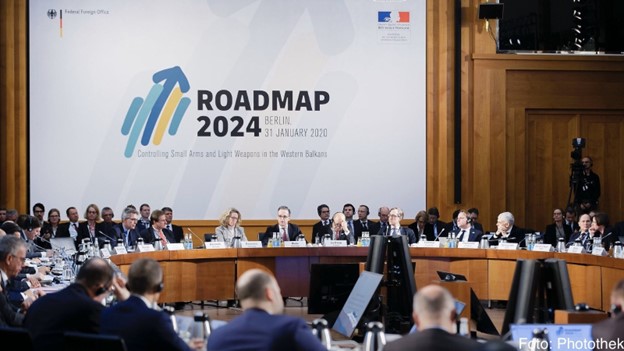 The Western Balkans Small Arms and Light Weapons (SALW) Control Road Map
A regional approach for a sustainable solution to the illegal possession, misuse and trafficking of SALW and their ammunitions
The Western Balkans Small Arms and Light Weapons (SALW) Control Road Map
A regional approach for a sustainable solution to the illegal possession, misuse and trafficking of SALW and their ammunitions

Challenges
The accumulation of small arms and light weapons (SALW) and their ammunition in the Western Balkans region, their storage conditions, illicit possession and policy implementation gaps, coupled with fragile political systems, continue to limit the effectiveness of SALW control efforts. Weak SALW control capacities directly and adversely affect the security and development of the region and perpetuate several types of violence, including gender-based violence.
Towards a Solution
The Road Map for a Sustainable Solution to the Illegal Possession, Misuse and Trafficking of SALW and their Ammunition in the Western Balkans by 20243 envisages the Western Balkans as a safer region and an exporter of security where comprehensive and sustainable mechanisms, fully harmonized with the European Union (EU) and other international standards, are in place to identify, prevent, prosecute and control the illegal possession, misuse and trafficking of firearms, ammunition and explosives.
Developed jointly by the Western Balkans Governments with technical support of UNDP SEESAC, under the auspices of France and Germany, and in consultation with the EU and other relevant actors, it is the most comprehensive arms control exercise in the region. Monitoring and coordination of the Road Map’s implementation, supported by the EU, is entrusted to UNDP SEESAC.
The road map is based on the regional cooperation principles, and it draws upon UNDP SEESAC’s signature solutions to arms control, rooted in almost two decades of work on all aspects of arms control, completed together with the governments in the region and in partnership with the EU.
When developing the road map, the authorities from Albania, Bosnia and Herzegovina, Kosovo, North Macedonia, Montenegro and Serbia defined 7 specific goals each pertaining to a key aspect of SALW Control, which they all aim to reach. In addition, they adopted a set of 14 Key Performance Indicators (KPIs), developed to ensure precise monitoring and evaluation of progress achieved under the road map.
This approach, driven by jurisdictions themselves and corresponding to their actual needs, has proven essential for recognizing the value and empowering key actors implementing changes, for ingraining a sense of local ownership and, consequently, for the sustainability of actions.
By advancing the road map’s goals, jurisdictions are working directly towards SDG 16, particularly SDG 16.4. The road map also places particular importance on the advancement of gender equality and SDG 5. The document was based on a gender analysis of SALW/firearms control in the region and reinforces its key recommendations. Furthermore, people have equally contributed to its development.
The participating jurisdictions report on the progress of the road map implementation through the submission of detailed narrative and KPI reports, reflecting on each of the predefined 7 goals and 14 KPIs, and hold local and regional meetings biannually with key implementing partners and donors. High-level Ministerial Meetings are held annually by the EU, Germany, or France.
These meetings provide the opportunity to review progress made in the implementation of the road map’s goals, to identify the remaining gaps, to present the data collected on the KPIs and to coordinate support provided by the implementing partners and donors.
Regional Roadmap Coordination meetings are also a platform for a vibrant exchange of practical lessons-learned and relevant information among jurisdictions implementing similar activities. The exchange of ideas and experiences contributes to a coordinated approach among all stakeholders, but also to the regional standardization of efforts and approaches to SALW Control.
The value of the model was recognized globally: in the UN Secretary General’s report to the Security Council on SALW, in the Outcome document of the 7th Biennial Meeting of States on the Programme of Action, by the UN Coordinating Action on Small Arms (CASA), by Germany’s Federal Foreign Minister H.E. Heiko Maas and by the EU’s Commissioner of Home Affairs H.E. Ylva Johansson.
The regional approach to tackling arms control encapsulated by the Western Balkans Road Map has already been replicated in its entirety by the countries of the Caribbean, with SEESAC’s advisory support. The Road Map for Implementing the Caribbean Priority Actions on the Illicit Proliferation of Firearms and Ammunition across the Caribbean in a Sustainable Manner by 20304 (the Caribbean Firearms Roadmap) was formally adopted in January 2021 by the 15 participating Caribbean Community (CARICOM) states and the Dominican Republic.
The main drafters and implementing partners for the Caribbean Firearms Road Map are the United Nations Regional Centre for Peace, Disarmament and Development in Latin America and the Caribbean and the Caribbean Community Implementation Agency for Crime and Security while the key donors include Germany, the United States of America, Canada and the United Kingdom.
The EU Commission integrated the Western Balkans SALW Control Road Map in the EU Action Plan on Firearms Trafficking5. Additionally, recognizing the quality of the comprehensive monitoring system developed under the Road Map, the EU Commission introduced the Road Map’s KPIs into the EU Action Plan as a way of initiating detailed data collection and monitoring of progress within the EU.
For the model to be replicated, political will is needed on the ground, ready to be executed through functioning teams of practitioners invested in the implementation of SALW strategies. A strong facilitator is needed to coordinate the process at the regional level, provide relevant technical and advisory support to the governments, monitor progress and coordinate the actions of the stakeholders. Strong donor support is also needed and implementors can provide relevant support to the authorities.
Contact Information
Countries involved
Supported by
Implementing Entities
Project Status
Project Period
URL of the practice
Primary SDG
Primary SDG Targets
Secondary SDGs
Secondary SDG Targets
Similar Solutions
| NAME OF SOLUTION | Countries | SDG | Project Status | |
|---|---|---|---|---|
100% Online Electronic Apostille and Legalization Sharing Colombia’s effective e-government system with other countries in the region |
Albania, Antigua and Barbuda, Bahamas, Barbados, Belize, Bosnia and Herzegovina, Dominica, Dominican Republic, Grenada, Guyana, Haiti, Jamaica, Kosovo, Montenegro, North Macedonia, Saint Kitts and Nevis, Saint Lucia, Saint Vincent and the Grenadines, Serbia, Suriname, Trinidad and Tobago | 16 - Peace and Justice Strong Institutions | Completed | View Details |
Accelerating the Implementation of African Union Treaties in São Tomé and Príncipe South-South learning from the Beninese judicial system’s experience in the application of human rights treaties to its national law |
Albania, Antigua and Barbuda, Bahamas, Barbados, Belize, Bosnia and Herzegovina, Dominica, Dominican Republic, Grenada, Guyana, Haiti, Jamaica, Kosovo, Montenegro, North Macedonia, Saint Kitts and Nevis, Saint Lucia, Saint Vincent and the Grenadines, Serbia, Suriname, Trinidad and Tobago | 05 - Gender Equality | Completed | View Details |
Accelerating the Transformational Shift to a Low-Carbon Economy in Mauritius Towards supplying 35 percent of the country’s energy needs with renewables by 2025 |
Albania, Antigua and Barbuda, Bahamas, Barbados, Belize, Bosnia and Herzegovina, Dominica, Dominican Republic, Grenada, Guyana, Haiti, Jamaica, Kosovo, Montenegro, North Macedonia, Saint Kitts and Nevis, Saint Lucia, Saint Vincent and the Grenadines, Serbia, Suriname, Trinidad and Tobago | 05 - Gender Equality 09 - Industry, Innovation and Infrastructure 13 - Climate Action | Ongoing | View Details |
Accelerator Labs Network Following collective intelligence methods to address emerging sustainability challenges and the growing demand for local solutions |
Albania, Antigua and Barbuda, Bahamas, Barbados, Belize, Bosnia and Herzegovina, Dominica, Dominican Republic, Grenada, Guyana, Haiti, Jamaica, Kosovo, Montenegro, North Macedonia, Saint Kitts and Nevis, Saint Lucia, Saint Vincent and the Grenadines, Serbia, Suriname, Trinidad and Tobago | 08 - Decent Work and Economic Growth 13 - Climate Action | Ongoing | View Details |
Access to Justice through e-Services and Dematerialized Case Management Scaling up connectivity and unlocking the digital potential of judicial institutions to enhance access to justice for all |
Albania, Antigua and Barbuda, Bahamas, Barbados, Belize, Bosnia and Herzegovina, Dominica, Dominican Republic, Grenada, Guyana, Haiti, Jamaica, Kosovo, Montenegro, North Macedonia, Saint Kitts and Nevis, Saint Lucia, Saint Vincent and the Grenadines, Serbia, Suriname, Trinidad and Tobago | 05 - Gender Equality | Completed | View Details |
